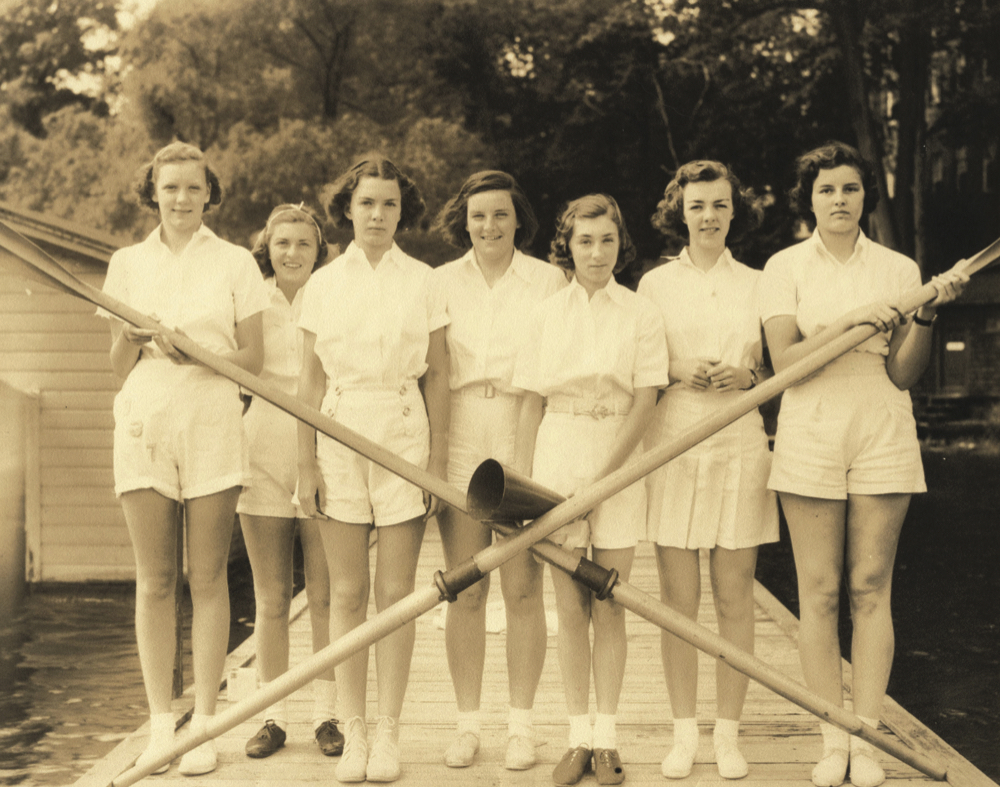Story by Jen Whiting / Photos by Ch'nel Duke / Historic photos courtesy of the Sturges family archives
There's a school you've found-or one you've heard about-and you have it in your heart to go there. It could be a high school, or college, it doesn't matter; it's where you want to be. Something about it just resonates. Something about it matters to you. In this story, that something is crew. You want to cox the crew there. You want to be on the water every day, practicing and racing and finding yourself among your teammates.
It might be far away, it might be too big for you, it might be scary, but you know yo going to do it anyway. You're going to get there, and cox and race and be in our element. You've grown up to do this, and you know it. For Dorris Forsbrey Sturges, the school was Wellesley College. She chose it because it had crew.
Sturges had grown up on the water of the Long Island Sound. Every day in the summer, she would be on the water with her father-or out in a rowboat-and watch the New York Athletic Club rowers glide past her, practicing along the shores near Pelham Manor, New York.
Growing up in Pelham Manor, the water was her second home. An only-child, she and her father sailed the Sound together. He'd captain his small yacht while Dorris would ride the dingy, bouncing up and down in it as it trailed behind.
"I'd listen to the crews as they went past," she told me on a sunny afternoon this summer, "and that's where I learned to cox. I loved being on the water. I always wanted to do that."
When she chose which school to go to, she knew she wanted to cox, which meant the school had to have crew. Trouble was, it was 1939, and women's sports were still intramural, at best, or non-existent, at worst. Wellesley, however, had crew, so that's where she chose to study. In many ways, the only difference between choosing a college now and choosing a college then is 77 years.
"I went to Wellesley because it had crew." Sturges, now 94 years old and living in Oberlin, Ohio, smiles as she tells me the story of her college choice. We sit on her patio, with a stack of her yearbooks on the fuzzy-backed vinyl tablecloth that reminds me of my grandmother's patio table.
"Was that unusual," I ask, a bit surprised. "Probably, yes, back then," she says, "but not for me. When there was something I wanted to do, I just did it."
Born in Brooklyn, New York, in 1922, Dorris Sturges spent her childhood playing baseball in elementary school, even though it wasn't the normal thing for girls to do. Her childhood home was two doors from the school and her mother would pass her sandwiches through the fence. "I was always small, but I was always athletic," Sturges says, as she pushes a plate of crackers toward me. "When I was in high school, I went to the Knox School, in Cooperstown [New York] for my last two years, because they had crew."
"Wait," I respond, "you chose a high school for crew, too?" Sturges smiles as if it was the most natural thing in the world. In an era before the second World War, this young woman was choosing where to go for high school and college as many young women do today: to play a sport, to be on a team, to develop as an athlete.
"I always liked the water," Sturges continues the story, "I gravitated toward it." This woman of nearly nine-and a-half decades pushes her high school yearbook across her patio table. "That's the Knox crew, there," she points with a hand that shakes slightly under the weight of the book.
Dorris Forsbey Sturges (third from right, with megaphone) stands with her Knox School crew in 1938.
In the picture is Dorris Forsbrey Sturges in the coxswain's seat, coxing a six-person wooden boat with her teammates rowing sweep oars. The lake opens up behind them. I lean in to see the details of the photo. It's grainy in a way that reveals its era. "They're rowing a six-person boat!" I say, excitedly. I'd never seen a 6+ before.
"When you went to Knox," I ask, "was it unusual to be on the crew team?" Sturges answers without thinking anything of it. "It wasn't unusual because I had lived right where they always did it." She clarifies, "The men did it. The men rowed."
When Sturges chose the Knox School for her junior and senior years of high school, and then again when she attended Wellesley College, she was joining a history, albeit short at that point in time, of women's rowing that was to become the foundation for women's rowing programs in the United States. The Knox School was founded in 1904 as an all-girls preparatory school. It moved several times in the 20th century, eventually landing on the North Shore of Long Island, where it stands today (it became co-educational in 1973). In 1920, The Knox School moved to the shores of Lake Otsego in Cooperstown, New York. It was there that crew was first offered.
"We competed between the classes," Sturges tells me, explaining that crew was an intramural sport at Knox, and at Wellesley. She remembers with a chuckle, "The seniors always won. Always."
Wellesley has offered rowing to its students since the late 1800s. In fact, Wellesley was the first college to offer crew as a sport for women in the United States. With a boathouse and rowing shells on Lake Waban, the on campus lake, the crew team in Dorris Sturges' time was intramural, offering the women of Wellesley athletic pursuits without intercollegiate competition. Now, the Wellesley novice rowers start on Lake Waban and then progress to the Charles River as varsity rowers. Coach Tessa Spillane has built the current Wellesley Crew into a rowing powerhouse, with Wellesley winning both the Seven Sisters Championship and the New England Women's and Men's Athletic Conference (NEWMAC) Championship each of the last six seasons and capturing their first-ever NCAA Division III Championship in 2016.
"We practiced every day in the spring," Sturges brings me back to the early 1940s, when she and her teammates were on Lake Waban, preparing for the intramural races that were held each spring. I ask her if she felt her personality suited her for coxing. "Oh, no," she says with a start, "I was always shy." Sturges then tells me what I've heard from coxswains all over the country: on land she was shy; in the boat she became the personality the boat needed to go fast. "I didn't have that personality naturally, no," she says. "I picked it up once I was in the boat, and I started to know what I was doing."
Armed with just a megaphone, Dorris Sturges coxed her crew on Lake Waban. "I used the megaphone, but not very often," she says. "I'd just call out the rhythm or I'd knock on the sides of the boat with my knuckles when I wanted the girls to speed up or slow down."
I ask her how she learned how to cox, if she received coaching on how to steer and make the calls. She laughs and her answer sounds familiar, "Oh, no. I just listened to the men from the [New York] Athletic Club, on the Sound by my house. That's how I learned." "Never any coaching?" I prompt again. "We had an old crotchety man at the boathouse that made sure we didn't put our foot through the wooden hull, but that was about it for coxing.
"You had to work to earn the rower's respect," she continues. "A coxswain without any respect from their crew, they couldn't do it, they couldn't cox. There's an amount of trust you have to build." I ask her how she built that trust with her crew.
She answered as if I had just asked her the most basic question. "By knowing what I was doing."
She reminisces about learning her coxing skills from watching and listening to the men who were rowing at the New York Athletic Club near her home in the summers. "That was a wonderful education on the Sound," she says. She explains how she steered the boat with a cord that attached through the coxswain's seat back to the rudder. Sound familiar?
The Wellesley coach was a woman, Mrs. Sturges tells me. "She was a lovely woman. I'm sorry I don't remember her name."
As the afternoon grows cooler, our conversation turns to talking about being a female athlete in her era. I ask her what coxing did for her development as a woman. "I was always very shy," she says again. She laughs the laugh of memory. "But I wasn't shy in the boat." She goes on and the air between us seems to grow thin, as if her story isn't that far from a story that could be told today. "If there was something I wanted to do, I just did it anyway. I don't know if it was unusual for that time. I just had to make my decisions." She pauses, "I got my love of boats from my father. He was a rower."
I ask her if Wellesley ever went to a regatta as a team. "No, there weren't opportunities for competition with other clubs. I would have liked to row against Vassar [College] or Smith [College]. If there had been opportunities, I would have taken them... " she trails off, then says with a chuckle, "I was born too soon."
After graduating from Wellesley, Sturges became a buyer for Macy's in New York City. She married in 1946, after her husband returned from World War IL Together, they raised three sons, Jeff, now the president of Resolute Racing Shells; Scott, a retired lawyer; and Chris, an engineer. When she and her husband moved to Oberlin, Ohio, in 1953, Dorris Sturges became a writer and newspaper editor, covering the local sports teams for the Oberlin News Tribune for twenty years. Her son, Scott, tells me she was often the only woman in the press box. "You really were a woman before your time," I exclaim. "Well, thank you!" is the answer from the 94-year old coxswain sitting across from me.
Of course, the question I'd wanted to ask all afternoon had to come up. "Did you ever feel-in the '30s and '40s-that you weren't allowed to do sports as a girl?" Her answer was more refreshing than it was surprising. "Oh, sure," she answers with an easy smile that holds no remorse, "but that just made me want to do it more."
An avid ice-skater and tennis player, she was active on the tennis court until seven years ago. "If someone wanted me to play today, I'd play," she says. Later, her son Scott tells me that the reason she stopped playing tennis is because all of her partners have passed away.
As the interview begins to wind down, her daughter-in law, Diane, brings out the athletic jacket the Wellesley Crew gave Dorris when she joined them at the 2013 NCAA Championships. She puts it on with the pride of any athlete who's ever donned a uniform.
I ask Mrs. Sturges what she would say to girls getting into the sport now. Without hesitation, she gives me what seems to be her mantra, words that are just as poignant today as they were when she coxed over seventy years ago, "Just go out and do it. You're very lucky. Make sure you go out and do what you want." Perhaps she knows that the best way to live one's life is to-well-live one's life, despite what others expect. Her story, your story. Are they really that different?
Dorris Sturges coxed the Wellesley Crew from 1939 - 1943. She says she was born too soon.






